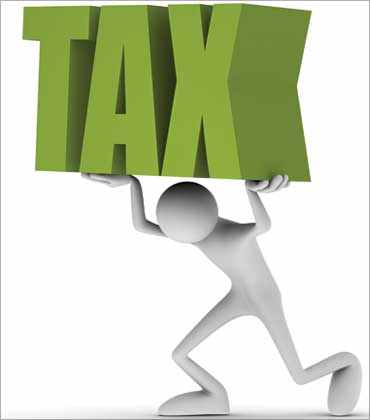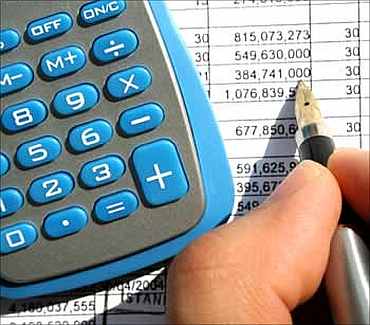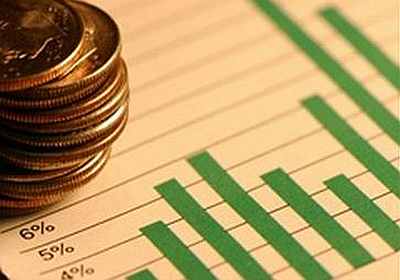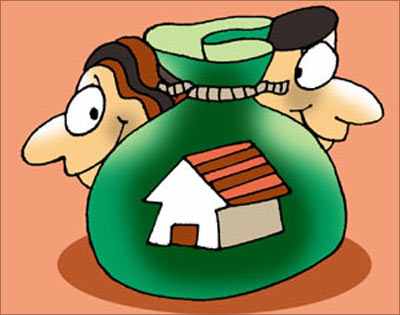Photographs: Rediff Archives
Real estate is a significant part of an investor's pie. It is also a time tested asset, which almost always appreciates except in times of severe economic downtrends, when it's temporarily affected.
In fact, buying real estate for investment purpose and selling it later at a higher price has become very common among investors.
Banks and other financial institutions (NBFCs or non-banking financial institutions) have also helped in this trend by providing easy loans to investors.
What is confusing for many investors though is the tax structure on these real estate transactions. Here, we will explore the tax liability on such transactions, also known as capital gain (or loss depending on whether the investor made money on the transaction).
...
Selling property? Know all about capital gain tax
Capital gain tax structure
The income tax rules define gain in two broad categories; namely short term capital gain (STCG) and long term capital gain (LTCG). If investors buy and sell assets within three years, this comes under short term capital gain. If investors buy real estate, keep it for more than three years and sell, it comes under long term capital gain.
For short term capital gain, the gain from asset is added to the investor's income and taxed as per the income slab they fall under.
For example, if an investor falls under the tax slab of 30 per cent, the gain will also be taxed at the rate of 30 per cent.
...
Selling property? Know all about capital gain tax
For long term capital gain, tax calculation involves what is known as indexation. The acquisition cost or cost of acquiring the asset is recalculated based on indexation.
Indexation is a concept, which factors inflation in its calculation by using a factor called cost inflation index (CII).
The cost inflation index number is published every year by Reserve Bank of India (RBI) and people can use it to find out the taxable gain on the transaction.
...
Selling property? Know all about capital gain tax
A note on Indexation
Suppose you bought two acres of land today at the rate of Rs 5 lakh per acre. This means your purchase price is Rs 10 lakh. After five years, the price goes up to Rs 7 lakh per acre. If you sell at the end of next five years, you will receive 14 lakh.
The holding period return will be 40 per cent or Rs 4 lakh (Rs 14 lakh to Rs 10 lakh). The question is should you pay taxes on the returns of Rs 4 lakh. The answer is: No.
The price of property will not be considered as Rs 10 lakh while calculating the gain. It will be taken as more than Rs 10 lakh by using CII. Hence the investor will have to pay taxes on an amount less than Rs 4 lakh.
...
Selling property? Know all about capital gain tax
Photographs: Rediff Archives
For instance, Rahul bought 10 acres of land at Rs 3 lakh per acre on January 30, 2000. He paid Rs 30 lakh for the property.
Case 1: He sold the property on April 30, 2002 at the rate of Rs 4 lakh per acre. This means he sold it at Rs 40 lakh and before three years.
Hence, short term capital gains will be applicable. In this case, there will be no indexation benefit and Rahul will have to pay tax on the gain which is Rs 10 lakh (Rs 40 lakh to Rs 30 lakh).
The gain of Rs 10 lakh will be added to his regular income and will be taxed as per the tax slab he falls into.
...
Selling property? Know all about capital gain tax
Photographs: Rediff Archives
Case 2: He sold the property on 10 January, 2004 at the rate of Rs 4.2 lakh per acre. This means he received Rs 42 lakh. Moreover, since this is done after 3 years, the gain will be taxed by factoring indexation.
Hence the investor will not pay tax on Rs 12 lakh (Rs 42 lakhs – Rs 30 lakh) but an amount lesser than Rs 12 lakh.
In this case, let's take a look at the CII numbers. Numbers for other years, which are not relevant to us, have been skipped.
| Year | Cost Inflation Index (CII) |
| 1981-82 | 100
|
| 1999-00 | 389 |
| 2003-04 | 463 |
...
Selling property? Know all about capital gain tax
Now to calculate long term capital gain, the acquisition price will not be taken as Rs 30 lakh, a new figure will be considered, this is also known as indexed cost of acquisition, which factors in CII.
The new price of acquisition = Initial price (CII for the year sold / CII for the year bought). This will give Rs 30 lakh (463 / 389) = Rs 35.71 lakh.
The capital gain will be Rs 42 lakh – Rs 35.71 lakh = Rs 6.29 lakh. This is the amount on which the investor has to pay taxes at the rate of 20 per cent. This means the investor will have to pay an amount of 20 per cent of Rs 6.29 lakh = Rs 1.25 lakh.
Note: Investors can deduct any other cost spent on the improvement of the property. This will take tax liability further down. You can also calculate indexed cost of improvement to take it further down.







article